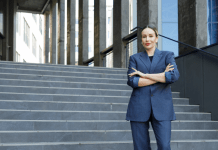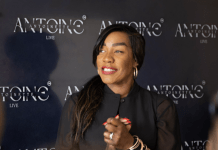Co-founder of Theramir Ltd, Promed Bioscience Ltd, RSL Revolutionary Labs Ltd, Dr Marianna Prokopi-Demetriades, is a world-renowned scientist. Even though she has had some challenges for the first three decades of her life, Marianna remains an expert in her field specialising in stem cell technologies, cancer biology, and nanotherapeutics. She has battled through losing family members, the pandemic slowing down her businesses and studying abroad with financial difficulties.
As a mentor and role model at FESTEM, (Female Empowerment in Science, Technology, Engineering and Mathematics in Higher Education) she continues her work to encourage more women in STEM and believes that her life experiences should show women they too could make a difference in the world.
“All my career choices, even the unfortunate ones, had a positive impact on my professional life. Lessons were learnt, risks were taken, research fields changed.”
What are some of the obstacles you overcame after gaining 5 degrees?
As my mother passed away when I was nine years old, my dad was the world to me. It was him that raised my sister and me and guided me to become an independent, tough woman. That came in handy during my university years as our financial situation changed drastically and family health emergencies knocked at our door. As far as I can remember, it was always a battle for me, trying to balance the much-needed part-time jobs (2 or 3 at the same time) and my university commitments.
As a Greek student in the UK, it was quite difficult to apply for financial aid and not feeling my family around me had also an emotional impact on me. During my PhD studies finding out that my father was suffering from cancer was another unique challenge I had to overcome. For many moments I thought that I had to sideline my dreams and leave everything behind. However, the love and the excitement I always had for science helped me stay focused and even more determined to succeed in my field.
Out of education and experience, which one would you say has shaped your career more?
Both. I really cannot distinguish between the two, especially in the biotech field where education and lab training matters. I was extremely lucky to attend some of the best Universities in the UK, especially graduating with a PhD from King’s College London. It was huge for me, and it created the foundation for many career opportunities. However, after graduating, I decided for personal reasons to move to Cyprus. It was an extremely difficult transition. Starting my first career steps during the 2012 crisis meant that I had to try extremely hard, not just to establish a career but to survive. For many years I had to work 2-3 different jobs; moving from the pharmaceutical industry to research, from research to academia, from academia to clinic.

All my career choices, even the unfortunate ones, had a positive impact on my professional life. Lessons were learnt, risks were taken, research fields changed. Finally, I reached my destination, entrepreneurship. That has had a real impact on society, and it’s where I belong.
What led to your decision to specialise in stem cell technologies, cancer biology, and nanotherapeutics?
As a child, I loved biology and science, figuring out how things work, mixing different materials, biology was the natural career path for me. I was always fascinated by the breakthroughs in the biotech field and was lucky and honoured to get a fully-funded PhD scholarship at King’s College Medical School with a specialisation in stem cells and nanotechnology. I became further excited to enter the biotech industry after meeting Sir James Black in the first year of my PhD studies. Having amazing conversations over coffee and tea with him was breathtaking. He was a Nobel laureate, and the person that inspired me to combine my research and entrepreneurial way of thinking to help grow companies that can completely transform how biology is done.
I initially wanted my work to have a tangible impact on people through improving therapeutic methods but having lost most of my immediate family members to cancer, now I want to feel my work is in service to others, and I believe careers in biotech provide an opportunity to do so.
How do you juggle your roles as a co-founder of 3 businesses in the medical field?
This is the most common question I get, and to be honest, the only recipe I can give is a few grams of multitasking, a lot of passion and having a great team around you that share the vision. Yes, it is hard, yes, my day sometimes feels like it has more than 24h, but the impact you have on society, in the patients’ lives, that keeps me going. We had really difficult experiences when starting, and all the work had to be shared between 2-3 people (mostly unpaid). We were managers, scientists, accountants, technicians, fundraisers, anything you could think of. Even graphic designers and website builders. But we lasted and now we have created an amazing team. I am very lucky to be surrounded by great people that fit in our companies and put in great effort to accomplish the companies’ vision. Today, I am still active in the lab, and I overlook everything from management to operations to sales, but I am focused mainly on the Leadership and Innovation of the companies, by creating value and keeping the vision alive.
Did the pandemic affect your work in any way, if so how?
The pandemic came as a shock, impacting many aspects of our lives and our businesses. Our new normality was much slower and uncertain. We battled for survival, but we needed to keep our team intact, so we decided (the founders) to remain unpaid for a long period. The much-needed investment essential for expansion was put on a hold and sales were frozen for quite some time. But we survived, we benefited from the quietness of the market to work on cutting-edge biotech ideas and initiated amazing new collaborations. We are in a very good position now; Theramir Ltd had finalised successfully the pre-clinical testing of our cancer therapeutic platform EVmiR, RSL Revolutionary Labs just launched the εὗSKIN dermaceutical line for oncology patients and Promed Bioscience Ltd moved to great collaborations in the tissue bioprinting field and the development of a novel atelocollagen type for wound and burns healing.

You’ve been a business owner for five years, do you have any tips on maintaining and growing a company?
One of the most important tips I would give is never ever to give up. Especially if in your business you have put your heart and passion into it and you want to create something new for the world. Surround yourself with the best people who have a vision for the future and strive to be authentic. Get organised, have a strategy, focus on short-term and long-term goals, and have a plan B and C ready. Invest in the company’s culture, invest in the brand, think about how you want your business to be perceived in the market now but also in the future. Understand your business capital needs, create a budget and try to stick to it, but incorporate also the cost of growth. Stay true to your North Star, your true-life purpose; then you will know what you want, and you can plan how to get it. I was always working with a 10-year plan, even though the steps to achieve my goals were always obstructed I was always finding a way to succeed.
How was it getting partnerships with research centres, cancer clinics, and patients?
We are very fortunate to have longstanding partnerships with academic institutions, research centres, clinics and patient societies. These partnerships have been critical to our ongoing success in the field of cancer research. The collaborations started many years ago through research projects funded by the European Eurostars Programs, and the Cyprus Research and Innovation Foundation Excellence Programs. Having an academic background makes collaborations easier. Together we accelerate the transition of lab-based discoveries to the clinic and use the expertise of a wide range of people from different disciplines to drive forward the development of new and innovative treatments and solutions. In addition, through clinical trials, we find new ways to improve the quality of life for people suffering from the disease. Involving patients is of the utmost importance, they are the key to tackling the bigger cancer questions.
What can societies and schools do to encourage more women in STEM?
 One of the most effective ways to create and maintain engagement is by introducing relatable STEM female role models who will show students what they too can achieve. The effectiveness of role models has roots in what’s called “observational learning,” where children learn and copy behaviours and actions by watching and listening to other people. Another good way to counteract this challenge is to inculcate a love for science early in the student’s life with practical, project work, improved laboratory facilities, new learning that enables students to build a bridge between what they can see, and encourage them to have scientific ideas that stem from their observations.
One of the most effective ways to create and maintain engagement is by introducing relatable STEM female role models who will show students what they too can achieve. The effectiveness of role models has roots in what’s called “observational learning,” where children learn and copy behaviours and actions by watching and listening to other people. Another good way to counteract this challenge is to inculcate a love for science early in the student’s life with practical, project work, improved laboratory facilities, new learning that enables students to build a bridge between what they can see, and encourage them to have scientific ideas that stem from their observations.
Especially for girls, I would encourage them by telling them: Just do it! Follow your interests, follow your instincts. Everyone needs to make their own choice about what they’re interested in and work hard to pursue it, especially in the field of STEM. There are always going to be setbacks and challenges. We always need to acknowledge what we learn from these and develop a healthy approach to resilience, perseverance, and persistence. Additionally, I would offer four pieces of advice to young women.
Be brave enough to:
- Be assertive and make your voice heard.
- Manage your career in a way that works for you.
- Take on difficult problems and trust in your talent and abilities.
- Be yourself and know that you can make a difference.















